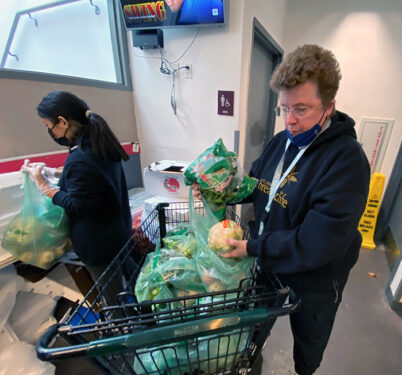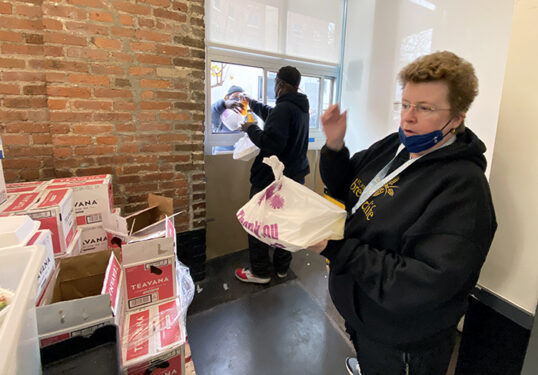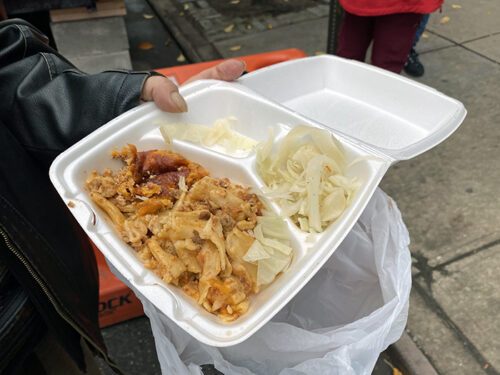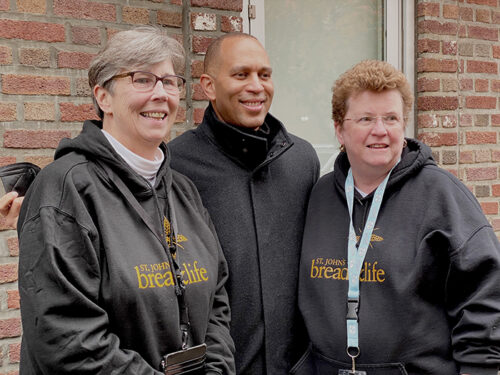BEDFORD-STUYVESANT — Mondays are always busy at St. John’s Bread & Life while the ministry serves bags of food and cooked meals.
But three days before Thanksgiving, the staff and volunteers at this former mattress factory on Lexington Avenue were scrambling to make room. Christmas music played in the background as they worked around the recently arrived pallets of boxed Thanksgiving Day meal ingredients to be distributed on Wednesday.
Still, it was a “business-as-usual” atmosphere as the team kept busy storing the regular arrivals of fresh produce and protein.
Meanwhile outside, clients received provisions to get them through the next couple of days — either bags of food or meals already cooked. Some clients did not wait to get home and ate their meals on the sidewalk. Sister Caroline Tweedy, R.S.M., the program’s executive director, prefers to call them “guests.” And these days there are a lot more of them.
Pandemic-induced supply chain disruptions have caused unwelcome food-price hikes and shortages on the eve of the 2021 Thanksgiving and Christmas holiday seasons, creating more food insecurity in New York City.

St. John’s has stayed ahead of the shortages by purchasing bulk items, particularly those with long shelf lives. The ministry also acquired more cooler capacity. Still, there is no way to avoid inflation.
“I can estimate, prior to COVID, we were able to distribute a hot meal for like $1.23,” she said. “And that cost has gone up to between $1.50 and $1.60.
“At first we thought this pandemic would be a month, maybe three months at the max, and we’d be going back to doing what we did normally. But now we’re into Year 2, and you look back and say, ‘Wow, we do things so differently now.’ ”
Sister Caroline said many food pantries closed during the pandemic, and groups that survived, like St. John’s, are determined to serve the people who now must seek out help in feeding their families.
A study by Food Bank for New York City reported that nearly 75% of emergency food providers (EFPs), such as pantries and food banks, saw dramatic increases in demand for service during the early days of the pandemic. A major cause: the business lockdowns that forced widespread unemployment.

But according to the report, 38% of the food providers suddenly closed because of social-distancing protocols. In Brooklyn, for example, the list of EFPs in operation shrunk from 257 to 164 as protocols continued, a loss of 93. Queens had 170, but lost 65, leaving 105 with open doors.
“In almost 90% of the cases, whether it’s a parish-based one or a small organization, it was volunteers who were doing the actual work,” Sister Caroline said. “So, in terms of being able to provide a safety component for people to serve, they temporarily closed or permanently closed. Some of them may have reopened, but I don’t know.”
Some continued operating because of St. John’s. During the interview in her office, Sister Caroline motioned to a whiteboard showing scheduled deliveries to those groups. Two years ago, there were just a couple; now there are 20.
One group not affiliated with St. John’s is Pastoral Social, the food ministry at Blessed Sacrament Parish in Jackson Heights, Queens. This organization actually began during the pandemic. It delivers bags of food to as many as 600 people each week, said Gonzalo Murillo, one of the founders.
The group doesn’t worry about a payroll because the workers, about a dozen of them, are all volunteers. Also, steady partnerships with food-distribution businesses, who prefer to be anonymous, have kept the ministry well-stocked, Murillo said.
Still, rising food prices have added unexpected problems.

For example, in recent weeks, the extra costs eliminated available donations of meat, poultry, and dairy products, he said. The ministry now focuses on delivering fresh vegetables, canned goods, and other nonperishable items.
“I know people are going back to work, but things are expensive,” Murillo said. “Everything has gone up. And I think people are more appreciative of the food than they were last year.”
Murillo added that a common supply-chain glitch these days is a shortage of truck drivers to move produce around the U.S. Consequently, a delivery may arrive several days later than expected — when volunteers are unavailable to accept it.
“In those situations, we have to tell them, ‘No, please give it to someone else,’ ” Murillo said. But sometimes, the group receives unexpected blessings.
Murillo had to cut short the interview with The Tablet when he learned his wife, Mayra, needed help picking up a surprise donation of 1,200 frozen chickens, just in time for Thanksgiving.
“I’m so happy!” he exclaimed before leaving the call.
Father Dwayne Davis is pastor of St. Thomas Aquinas Parish in Flatlands, Brooklyn, and the administrator of Our Lady Help of Christians Parish in Midwood, which has an active food pantry.
Earlier this year, Father Davis received the COVID-19 Hero award from Brooklyn Borough President and NYC mayor-elect Eric Adams. The award recognized Father Davis and 60 volunteers for having operated a temporary food pantry at St. Thomas Aquinas that fed more than 69,000 people.
The award was ironic, Father Davis said; he had earlier decided he couldn’t operate a food pantry at that parish because he didn’t have room. The COVID lockdowns took care of that; when students could not attend the parish school for a time, so the space became available.
The wildly successful pantry shut down when classes resumed at the school. But now, Father Davis said with a chuckle, he is being lured back into the role of an EFP.
“Since people in the neighborhood heard about the award, I’ve been getting tons of phone calls and emails from people wanting to donate food,” he said. “Then the reverse of that is, I get calls from people who are needing food.”
So Father Davis is currently collecting food donations, which he sends to the pantry at Our Lady Help of Christians. Monetary donations fund $50 gifts for families; they can use those to buy holiday poultry and ingredients for side dishes at a local food market whose managers prefer to be anonymous, he explained.
The parish is also accepting donations to pay for Christmas gift cards that can be used to buy food and gifts at local retailers. Father Davis credited Knights of Columbus Council 126 and Boy Scout Troop 193 for aiding the efforts.
“We always try to help and support the community as best as we can,” he said. “We know that there are needs. We might not be able to help in a big way, but we still help with each little bit.”
Outside St. John’s, a man who went only by “John” praised the ministry and noted that he has been both a guest and a volunteer there for 20 years. He said its services are especially needed now.
“They’re having problems shipping food around because of the COVID,” he said. “The economy is slowing down. Everything is slowing down. We have poor people all over the place. I don’t think it is ever going away. It’s broken.”
“But these people,” he said, pointing at the former mattress-factory-turned-food-pantry operation. “They’ve been here. And they’ve been beautiful.”
Sister Caroline expressed confidence the ministry would continue, although some questions remain unanswered.
“The budget here grew from $3 million to more than $5 million,” she said. “In some respects, it’s a good thing.
“Ninety percent of our budget is privately raised. So we raise a little bit more than $4 million a year. And that other million is a combination of government support in the form of food vouchers and things like that from the city.
“But what happens when COVID is over, and you still have the high numbers? Funding could be an issue, and that’s the one thing that I always worry about.”

